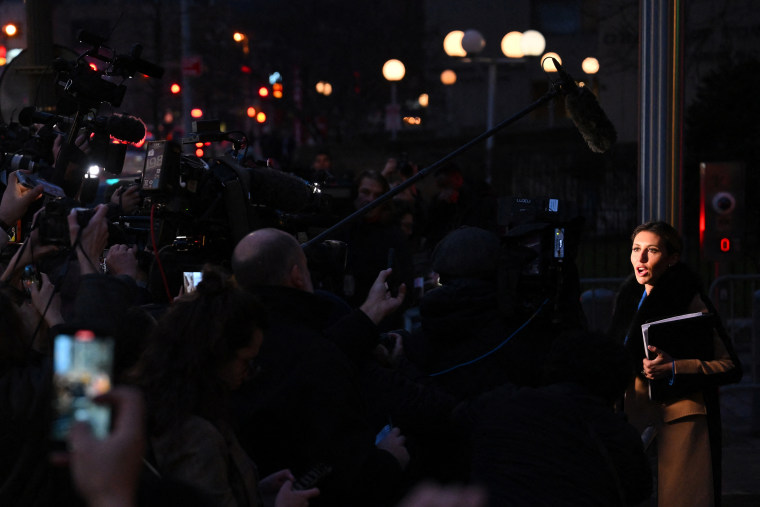Former President Donald Trump's attorney Alina Habba on Tuesday backed off of a conflict of interest claim against the judge who presided over the E. Jean Carroll defamation trial after Carroll's lawyer threatened to pursue sanctions.
Habba on Monday filed a letter with the court citing a New York Post story that said U.S. District Judge Lewis Kaplan and Carroll attorney Roberta Kaplan, who are not related, had worked at the major law firm Paul, Weiss, Rifkind, Wharton & Garrison in the 1990s. An unidentified former partner at the firm, which employs around 1,000 lawyers, told the Post that Lewis Kaplan had been “like her mentor."
Habba told the New York Post that the situation was "insane and so incestuous."
"This is news to us,” Habba told the paper on Saturday, a day after the jury in the case hit Trump with an $83.3 million verdict. “We are going to include this in our appeal and take appropriate measures. The fact it wasn’t disclosed is an ethics violation.”
The article included a quote from Roberta Kaplan's spokesman Zak Sawyer, who said while they'd worked at the same large law firm, they “overlapped for less than two years in the early 1990s." The now-judge "was a senior partner and she was a junior associate and she never worked for him,” Sawyer said.
In her letter on Monday, Habba said, "If Your Honor truly worked with Ms. Kaplan in any capacity—especially if there was a mentor/mentee relationship—that fact should have been disclosed before any case involving these parties was permitted to proceed forward." She suggested he had violated the judicial code of conduct and that she might use the allegation as ammunition in a request for a new trial.
She noted she'd had "many clashes" with the judge during the trial and another last year and said he'd been "overtly hostile towards defense counsel." Her letter suggested the "conflict" might have something to do with his "rulings, tone, and demeanor."
"Here, without knowing more information (or having a specific factual denial by Your Honor that you had a mentor-mentee relationship with Ms. Kaplan), we are unable to flesh out our position concerning what specific relief should be requested, including, but not limited to, moving for new trials on the issues of liability and damages. Surely, however, this Court should provide defense counsel with all of the relevant facts," Habba wrote. "We thank the Court for its prompt attention to this troubling matter."
Roberta Kaplan responded in a letter of her own to the judge Tuesday, saying the "allegations are utterly baseless."
She said she started at the Paul, Weiss firm as a junior litigation associate in October 1992, when Lewis Kaplan was a senior litigation partner. He was nominated to the bench by then-President Bill Clinton and confirmed by the Senate in August 1994.
"During that relatively brief period more than thirty years ago, I do remember the Paul, Weiss partners with whom I worked and none of them was Your Honor. More specifically, I have no recollection from that time period of ever interacting with Your Honor on a case, participating with Your Honor in a client or case-related meeting, or attending a court proceeding with Your Honor. In fact, I remember no direct interaction from that time period with Your Honor at all," her letter said.
"Needless to say, at no point have we ever had a '"mentor" type relationship,' as alleged by Ms. Habba," the attorney said.
Roberta Kaplan said the allegation was part of the Trump team's scheme to discredit the judicial system and suggested that she might seek sanctions against Habba.
"While Ms. Habba ends her letter by characterizing this as a 'troubling matter,' what is actually troubling is both the substance and timing of her false accusations of impropriety," she wrote.
"From the very start of the recently concluded trial, Donald Trump and Ms. Habba have pushed a false narrative of judicial bias so that they could characterize any jury verdict against Trump as the product of a corrupt system. While that strategy has now moved into its post-verdict phase, it is now time for Defendant’s false and vexatious claims of bias or impropriety to stop."
Habba responded with another letter a short time later, saying she hadn't made any "false allegations."
"The purpose of the letter was simply to inquire as to whether there is any merit to a recently published New York Post story which reported on the alleged existence of such a relationship," she wrote. "Since Ms. Kaplan has now denied that there was ever a mentor-mentee relationship between herself and Your Honor, this issue has seemingly been resolved."
A court official said the judge had no comment.


